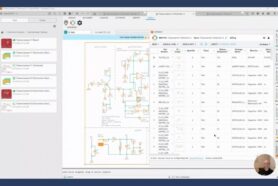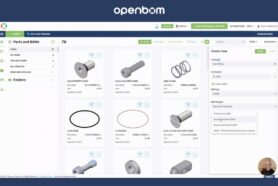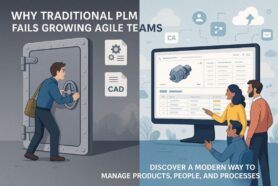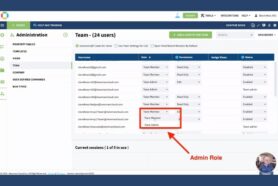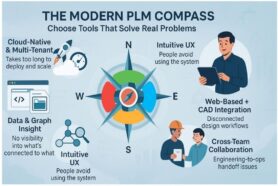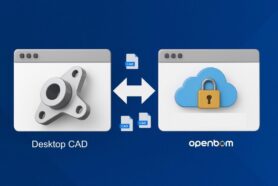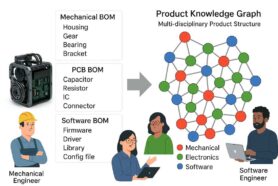
Just in a few days, we will step in a new decade. As always at the end of the year, we ask ourselves what we learned in the past year and what we would like to take with us in a new year and especially in a new decade.
We learned a bunch of things during 2019 working with many manufacturing companies, engineers, contractors and we are grateful for what we learned. Today I want to share some of these things that can help you in the next year.
Our personal and professional life is becoming more digital every day. But, as always, changes are not a simple thing to do. I can see manufacturing companies struggling with many challenges and one of the most fundamental ones is related to data management.
As a manufacturing company, the data about the product and related information is a foundation of everything. An average manufacturing company is usually swamped with legacy data, documents (CAD and others) as well as tons of Excels. This is an ugly reality. Think about digital transformation? You cannot achieve that by placing your Excel files to Dropbox. So, how to do so?
1- Reward digital data first paradigm
Everyone needs data, but nobody likes and wants to do data management. I learned this paradox many years ago. To define what data is needed for a company is a big work. For some companies, it is about re-organizing their existing enterprise systems. But in many cases, it is about finding all Excels and creating a map of data company needs to manage.
Management should reward people for doing this job because this is the first step in the process to transform the company. The rewards in a better data organization are huge. You can eliminate tons of dupes, you can simplify data storage and you can think about data models (ways to organize the data). The second step is to reorganize the processes that using this data. The processes should felt “digital” and not like doing the same paperwork with electronic documents.
2- Learn basic paradigms to escape from Excel
Changes are hard. Changes in the way you work can feel like a big hurdle to everyone. Every company that does production has some processes in place. It might include a bunch of Excels and its other systems. To convince people to change is not simple. Sometimes it is threatening.
To make a change experience easier, you should allow some time to learn the basic paradigms of the software. Fortunately, modern software tools are designed with specific experience in mind. Learn basic concepts of data management, changes and then make a mental map of how existing data and processes can be mapped and later transformed.
Here are a few don’ts. You should not try to mimic your Excel data management practices with new software. Usually, Excels are creating many data redundancies as well as creates workaround to maintain connections – hierarchies, instances, and reports.
3- Solve the biggest problem – item data, BOM, cost, purchases
When you embark on a change, remember to focus on the biggest hurdle the company has. From my experience, they are about organizing data to support a single version of the truth, managing BOM structures, creating reports (especially cost) and managing purchases. On top of that communication and data sharing often a big problem. Especially if you work in a distributed environment.
Focus on how to solve problems step by step. Modern SaaS applications allow you to start right away and don’t require to make big preparation. Just by eliminating all excel files to create a set of catalogs for all items (purchased, standard, engineering, etc.) can solve many problems. Then make step by step to bring new functions to the team.
4- Support Openness
One of the reasons, we found Excel appealing to many people is a function of control. An Excel file gives you a feeling of data control that cannot be influenced and changed by other people or organizations. While data control is important, remember that data silos are one of the main sources of inefficiency and complex process. Opposite to that, openness and data sharing is a way to streamline the process, make it faster and more efficient.
Conclusion.
The technologies we have today are amazing in the way they can help to create flexible data management platforms, to make data globally available, to collaborate and communicate with the teams in real-time. A modern data management approach combined with cloud technologies is a foundation for new SaaS PLM solutions.
OpenBOM was developed from scratch using modern cloud and data management technologies, It is flexible yet affordable to provide you a unique combination of value and return on investment. Because of cloud and multi-tenant data management, you can start right away and grow as you expand the solution.
Start using OpenBOM today by registering to free OpenBOM user subscription here.
Happy New Year!
Best, Oleg @ openbom dot com.
Let’s get to know each other better. If you live in the Greater Boston area, I invite you for a coffee together (coffee is on me). If not nearby, let’s have a virtual coffee session — I will figure out how to send you a real coffee.
Want to learn more about PLM? Check out my Beyond PLM blog and PLM Book website
Image by Gerd Altmann from Pixabay
Join our newsletter to receive a weekly portion of news, articles, and tips about OpenBOM and our community.

